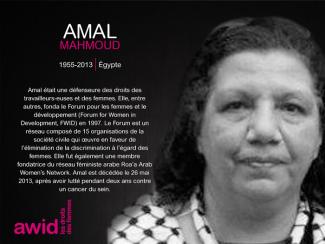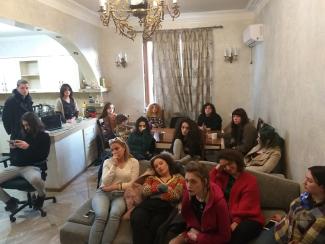
Muriel Duckworth

El activismo joven feminista juega un papel fundamental en las organizaciones y los movimientos por los derechos de las mujeres a nivel mundial, ya que aborda los nuevos problemas a los que las feministas se enfrentan en la actualidad. Esta fuerza, creatividad y adaptabilidad son esenciales para la sostenibilidad de la organización feminista.
A la vez, enfrentan obstáculos específicos para ejercer su activismo, como acceso limitado al financiamiento y al apoyo, falta de oportunidades de capacitación, un incremento considerable de los ataques contra las jóvenes defensoras de los derechos humanos. Esto crea una falta de visibilidad que hace más complicada su inclusión y participación efectiva en los movimientos por los derechos de las mujeres.
El programa de activismo joven feminista fue creado para garantizar que las voces de las jóvenes sean escuchadas y se vean reflejadas en el discurso feminista. Queremos garantizar que las jóvenes feministas tengan un mejor acceso al financiamiento, a las oportunidades de desarrollo de las capacidades y a los procesos internacionales.
Además de apoyar directamente a las jóvenes feministas, estamos trabajando con activistas por los derechos de las mujeres de todas las edades, con modelos y estrategias prácticas para procesos efectivos de organización intergeneracionales.
Queremos que las activistas jóvenes feministas jueguen un papel en el proceso de toma de decisiones que afectan sus derechos a través de:
Fomento de la comunidad e intercambio de información a través de la Conexión Joven Feminista. Dada la importancia de los medios virtuales para el trabajo de las jóvenes feministas, nuestro equipo lanzó la Conexión Joven Feminista en mayo de 2010 para compartir información, construir capacidades a través de seminarios web y discusiones electrónicas y para alentar la construcción de la comunidad.
Investigación y generación de conocimientos sobre el activismo joven feminista, que aumenten la visibilidad y el impacto del activismo joven feminista en los movimientos por los derechos de las mujeres y otros actores clave, como los donantes.
Promoción de procesos más efectivos de organización intergeneracional, explorando mejores formas de trabajar en conjunto.
Apoyo a la participación de las jóvenes feministas en los procesos globales de desarrollo, por ejemplo en los procesos de Naciones Unidas.
Colaboración con todas las áreas prioritarias de AWID, incluyendo el Foro, para garantizar así que las contribuciones clave de las jóvenes feministas, así como sus perspectivas, necesidades y activismo se reflejen en los debates, políticas y programas que las afectan.
Un an seulement après sa fondation, les membres de Nadia Echazú ont commencé à travailler dans la haute couture et ont organisé un défilé de mode dans l'historique hôtel Bauen.
Elles ont montré cinq modèles et quelques travailleuses de la coopérative textile ont même défilé avec leurs propres créations.
C'était révolutionnaire non seulement parce qu'elles concevaient des alternatives à la mode grand public, mais aussi parce qu'elles créaient des vêtements accessibles et inclusifs pour les corps trans et travesti.
Il n'y a pas d'économies féministes sans vêtements qui nous font nous sentir incroyables et confortables!
Nuestro nuevo documento de investigación El diablo se esconde en los detalles aborda la falta de conocimientos sobre los fundamentalismos religiosos en el sector del desarrollo, y se propone comprender mejor de qué manera estos fundamentalismos inhiben el desarrollo y, en particular, los derechos de las mujeres. Propone recomendaciones para que quienes trabajan en temas de desarrollo desafíen la labor de los fundamentalismos y eviten fortalecerlos inadvertidamente. [CTA download link: Leer el documento completo]
| Graphic1 | 1. Control of women’s bodies, sexuality, and choice are “warning signs” of rising fundamentalisms. |
| 2. Neoliberal economic policies have a particularly negative impact on women, and fuel the growth of religious fundamentalisms. | Graphic2 |
| Graphic3 | 3. Choosing religious organizations as default for partnerships builds their legitimacy and access to resources, and supports their ideology, including gender ideology. |
| 4.Everyone has multiple identities and should be defined by more than just their religion. Foregrounding religious identities tends to reinforce the power of religious fundamentalists. | Graphic4 |
| Graphic5 | 5. Religion, culture, and tradition are constantly changing, being reinterpreted and challenged. What is dominant is always a question of power. |
| 6. Racism, exclusion, and marginalization all add to the appeal of fundamentalists’ offer of a sense of belonging and a “cause”. | Graphic6 |
| Graphic7 | 7. There is strong evidence that the single most important factor in promoting women’s rights and gender equality is an autonomous women’s movement. |
El Diablo se esconde en los detalles proporciona detalles de las graves violaciones a los derechos humanos y, en particular, de las violaciones a los derechos de las mujeres, causados por los fundamentalismos auspiciados por los Estados, así como por actores fundamentalistas no estatales como milicias, organizaciones comunitarias confesionales e individuos. La profundización fundamentalista de normas sociales atávicas y patriarcales está provocando el aumento de la violencia contra las mujeres, las niñas y las defensoras de derechos humanos (WHRDs). El informe propuesta estas ideas clave para abordar el problema:
Quienes trabajan en el desarrollo están de capacidad de asumir una posición más firme. Su capacidad colectiva para reconocer y enfrentar conjuntamente a los fundamentalismos religiosos resulta crucial para promover la justicia social, económica y de género y los derechos humanos de todas las personas en el marco del desarrollo sostenible. Resulta fundamental promover que el poder y los privilegios se entiendan desde la óptica del feminismo interseccional y aplicar esta comprensión a los interrogantes sobre religión y cultura. Las organizaciones de mujeres ya poseen conocimientos y estrategias para oponerse a los fundamentalismos. Quienes trabajan en el desarrollo deberían apoyarse en estos e invertir en coaliciones enfocadas en múltiples temáticas. Lo anterior, les ayudará a alcanzar nuevos horizontes.
The AWID Forum registration fees for all forum participants cover:

Mridula was a strong advocate for the advancement for women’s health at a time when the topic of women’s sexual and reproductive health were considered taboo in Fiji.
The initial works of the Fiji Women’s Rights Movement about sexual and reproductive rights were under her guidance, and in September 1999, the United Nations Population Fund presented her with a regional award for Reproductive Health and Rights. Mridula was a strong, dedicated and tireless campaigner who was passionate about women’s health and empowerment.
She was a valued member of the women’s and feminist movement in Fiji and her contributions will always be remembered. Mridula passed away due to natural causes in 2017.

Solidarity Network
O objetivo principal do inquérito WITM é chamar a atenção para o estado financeiro dos diversos movimentos feministas, de direitos das mulheres, de justiça de género, de LBTQI+ e de aliados globalmente, e com base nisto, fortalecer ainda mais o argumento para transferir mais recursos de melhor qualidade e poder para os movimentos feministas.
Learn more about Feminist Realities
Any questions? Please do not hesitate to contact us
More than just an event, the AWID Forum is part of our Feminist Realities Journey, with many spaces to come together, online and offline, for sharing, discussing, strategizing and co-creating feminist realities.
Learn more about the Feminist Realities Journey and everything that will happen before the Forum. Join our mailing list to stay tuned for Post-Forum announcements!
We are exploring options to participate virtually at the Forum and we will share information when we know what we can offer.

Amal fue una destacada política y parlamentaria de Libia.
Fue docente de la Universidad de Benghazi desde 1995 hasta su muerte, en 2017. Amal fue activista de la sociedad civil e integrante de varias iniciativas sociales y políticas. Asistió a las familias de lxs mártires y de lxs desaparecidxs y fue una de lxs fundadorxs de una iniciativa juvenil llamada «Juventud de Benghazi Libia».
En las elecciones parlamentarias de 2014, Amal fue elegida para la Cámara de Representantes con más de 14.000 votos (el mayor número de votos recibido por unx candidatx en las elecciones de 2014). Permanecerá en la memoria de muchxs como una mujer que actuó en política para garantizar un futuro mejor en uno de los contextos de la región más difíciles y afectados por los conflictos.


Não, solicitamos apenas um inquérito completo por grupo.
La cadre des Réalités Féministes du Forum repose sur six points d’ancrages thématiques. Chaque point d’ancrage met les réalités, les expériences et les visions féministes au coeur du continuum entre résistance et proposition, lutte et alternative. Nous cherchons à explorer ensemble ce qui constitue nos réalités féministes et ce qui leur permet de se répandre dans les différentes sphères de nos vies.
Ces réalités se manifestent sous forme de modes de vie pleinement articulés, de rêves et d'idées en devenir, ou encore d'expériences et de moments précieux.
Plus que des thèmes isolés, les points d’ancrage sont des conteneurs interconnectés à l’effet des activités du Forum. Nous prévoyons de nombreuses activités à l’intersection de ces thèmes, des différentes luttes, communautés et mouvements. Encore provisoires, les descriptions continuent d’évoluer au fur et à mesure que le parcours des Réalités Féministes se poursuit.
Ce point d’ancrage met l’accent sur la façon dont nous répondons à nos besoins fondamentaux et assurons les ressources qui nous sont nécessaires pour prospérer, en tant qu’individus, communautés et mouvements, d’une manière qui prenne soin des personnes et de la nature en priorité. Nous entendons par “ ressources ” l’alimentation, l’eau et l’air pur, ainsi que l’argent, le travail, l’information, la connaissance, le temps et autres.
S’appuyant sur la résistance féministe face au système économique d’exploitation et d’extractivisme, ce point d’ancrage met en lumière les propositions, expériences et pratiques féministes puissantes et inspirantes concernant l’organisation de notre vie économique et sociale. L’alimentation et la souveraineté alimentaire ainsi que les visions féministes du travail et des systèmes commerciaux justes et durables ne constituent que quelques-unes des questions qui feront l’objet de notre exploration. Nous ferons courageusement face aux contradictions qui émergent de la nécessité de survivre dans des systèmes économiques répressifs.
Ce point d’ancrage intègre le financement et le ressourcement pour les organisations et les mouvements dans une vaste analyse féministe de la justice économique et de la création de richesses. Il examine comment déplacer les ressources là où elles sont nécessaires, de la justice fiscale et du revenu de base à différents modèles de philanthropie et au ressourcement créatif et autonome des mouvements.
Nous cherchons à créer de nouvelles visions et à amplifier les réalités et les expériences existantes en termes de gouvernance féministe, de justice et de responsabilisation. Face à la crise mondiale et à la montée du fascisme et du fondamentalisme, ce point d’ancrage se concentre sur les modèles, les pratiques et les idées féministes, radicales et émancipatrices d’organisation de la société et de la vie politique, à l’échelle locale et mondiale.
Ce point d’ancrage explorera les aspects de la gouvernance, depuis les expériences féministes du municipalisme jusqu'à nos visions du multilatéralisme, en passant par la construction d'institutions situées à l’extérieur des États-nations. Nous échangerons nos expériences concernant les processus judiciaires et de responsabilisation au sein de nos communautés, nos organisations et nos mouvements, notamment les modèles de justice réparatrice, communautaire et transformatrice qui rejettent la violence étatique et le complexe carcéro-industriel.
En nous concentrant sur les expériences de voyages, de migrations et de refuges ainsi que sur l’organisation féministe, nous voulons un monde sans régimes frontaliers mortels; un monde où la circulation y est libre et les voyages passionnants.
Le rôle de la technologie dans nos vies ne cesse de croître et la frontière entre les réalités en ligne et hors ligne continue de s’estomper. Les féministes se servent largement des technologies et des espaces en ligne pour construire la communauté, apprendre les un-e-s des autres et mobiliser l’action. Grâce aux espaces en ligne, nous pouvons repousser les limites de notre monde physique. En revanche,, les communications digitales appartiennent majoritairement à des sociétés n’assumant qu’une part de responsabilité mineure vis-à-vis des utilisateurs-trices : l’exploration de données, la surveillance et les atteintes à la sécurité sont devenues la norme, de même que la violence et le harcèlement en ligne.
Ce point d’ancrage explore les opportunités et les enjeux féministes qui existent au sein des réalités digitales. Nous nous pencherons sur les alternatives qui se présentent face aux plateformes privées qui dominent l’horizon digital, ainsi que sur les stratégies de bien-être pour la navigation d’espaces en ligne et les utilisations de la technologie comme moyen de surmonter les problèmes d’accessibilité. Nous examinerons ce que la technologie peut apporter en termes de plaisir, de confiance et de relations.
Les réalités féministes règnent également en nous-mêmes: il s’agit de l’expérience incarnée. Le contrôle dont font l’objet notre travail, notre reproduction et notre sexualité est toujours au coeur des structures patriarcales, cis-hétéro-normatives et capitalistes. Face à cette répression, des personnes de genre, de sexualité et d’habiletés différentes organisent des rencontres, créent des espaces et conçoivent des sous-cultures destinées à la joie, à la sollicitude, au plaisir et à une profonde appréciation mutuelle et de soi-même.
Ce point d’ancrage explorera les idées, les récits, les inventions et les expressions culturelles du consentement, du pouvoir et du désir des femmes, des personnes transgenres, non-binaires, transexuelles et intersexuées dans différentes sociétés et cultures.
Nous échangerons des stratégies visant à obtenir les droits en termes de santé reproductive et la justice, et exposerons des pratiques sociales facilitatrices et respectueuses de l’autonomie, l’intégrité et la liberté corporelles. Ce point d’ancrage relie différentes luttes et différents mouvements afin de partager nos perceptions et nos expériences de ce que sont le bien-être et le plaisir.
Imaginez une planète féministe. Quel est le son de l’eau, l’odeur de l’air, le contact de la terre? Quelles sont les relations entre la planète et les êtres vivants, y compris les êtres humains? Les réalités féministes sont celles d’une justice environnementale et climatique. Les luttes féministes, autochtones, décoloniales et écologiques puisent souvent leurs racines dans des visions transformatives ainsi que dans la relation entre la nature et les êtres.
Ce point d’ancrage se concentre sur le bien-être de notre planète et s’interroge sur les façons dont les êtres humains ont interagi avec elle et l’ont transformée. Nous voulons explorer les aspects des savoirs traditionnels et de la biodiversité dans le cadre de la préservation d’une planète féministe, et acquérir des connaissances sur les pratiques féministes dans le domaine de la décroissance, la pratique des communs, les modèles d’économies parallèles, l’agro-écologie et les initiatives en termes de souveraineté alimentaire et énergétique.
Bien que nous considérions tous ces points d’ancrage comme étant reliés, celui-ci est véritablement transversal; nous vous invitons donc à ajouter une dimension organisationnelle à tous les points d’ancrage auxquels les activités que vous proposez sont liées.
Comment se déroule l’organisation féministe dans le monde aujourd’hui? Cette question porte notre attention sur les acteurs, la dynamique du pouvoir, les ressources, le leadership, les économies dans lesquelles nous sommes intégré-e-s, notre compréhension de la justice et de la responsabilisation, l'ère numérique et les expériences que nous faisons de l'autonomie, du bien-être et des soins collectifs. Nous espérons, à travers tous ces points d’ancrage, créer un espace de réflexion sincère autour de la répartition du pouvoir et des ressources et de la négociation au sein de nos propres mouvements.
Le Forum se veut bien plus qu’un événement de quatre jours. C’est un arrêt de plus dans un parcours de renforcement de mouvement autour des réalités féministes, lequel a déjà commencé et continuera bien au-delà des dates du Forum.
AWID is closely monitoring the global COVID 19 situation and for now anticipates continuing with the Forum as planned.
If at any moment the situation demands something different, we will let you know right away.
The 14th AWID International Forum is scheduled to take place 20-23 September 2021 in Taipei,.

Engagée auprès de jeunes lesbiennes, gays, bisexuels, transgenres, intersexuels, queers, et transgenres (appelés Brotherboys-BB et Sistergirls-SS dans la communauté aborigène en Australie), Rocky faisait preuve de vision et d'un leadership inspirants.
Rocky avait commencé sa carrière auprès de la police du Queensland en tant qu'agent de liaison. Faire une différence était très important pour elle. Elle a mené un travail de soutien impressionnant auprès de jeunes de cette communauté en tant que responsable du service jeunesse « Open Doors » (portes ouvertes). Rocky a œuvré dans des situations complexes liées spécifiquement aux questions de genre et d'identité sexuelle.Elle avait un don naturel dans ce domaine: c’était une leader communautaire solide, une femme sereine, une amie fidèle, une personne aimante et attentionnée ainsi qu’une actrice du changement. Rocky était membre fondatrice d’IndigiLez Leadership and Support Group.
En 2016, à la Cour suprême de Brisbane, l'ancien juge de la Haute Cour, Michael Kirby, a cité le nom de Rocky lorsqu'il a loué le travail du service juridique de la communauté LGBTI au fil des années. Rocky s'est engagée très fermement en faveur des droits humains de la communauté « LGBTIQBBSG », elle a repoussé les limites et induits des changements de manière respectueuse et aimante.


ما لم تكن هناك مشكلات في إمكانية الوصول و/أو إذا كنت تملأ/ئي الاستبيان بلغات أخرى، فإننا نشجعك بشدة على استخدام KOBO لجمع وتحليل البيانات الموحدة للاستطلاع.